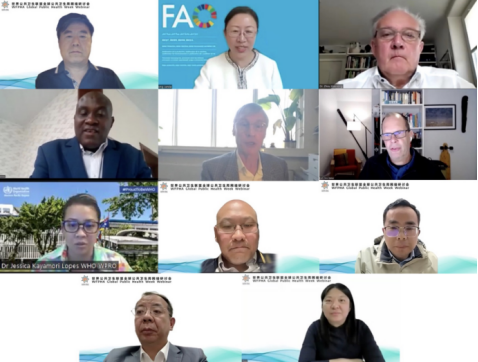A global webinar on public health, with a specific theme "Utilizing a Systems Thinking Approach of One Health: Rethinking Public Health Paradigms", was launched by the Chinese Preventive Medicine Association (CPMA) on April 8, in response to the Global Public Health Week initiative by the World Federation of the Public Health Associations (WFPHA).
This collaborative effort involved the CAST UN Consultative Committee on Life Science and Human Health (CCLH), the School of Global Health (SGH), the Chinese Center for Tropical Diseases Research at Shanghai Jiao Tong University School of Medicine, and the Preventive Medicine Association of Hubei Province.
Virtually attended by a slew of esteemed professionals on public health, the webinar focused on promoting the advances in the One Health Initiative, a movement to forge co-equal, all-inclusive collaborations between physicians, osteopathic physicians, veterinarians, dentists, nurses, and other scientific-health and environmentally related disciplines.
The event was divided into three sessions: the opening ceremony, themed reports, and roundtable discussions. These sessions were overseen by two hosts including Yi Heya, who is the deputy director of the CPMA Department of International Affairs, and Zhou Xiaonong, who serves as the head of the World Association of Chinese Public Health Professionals of the CPMA and chief editor of the journal Science in One Health.

Experts participate in the roundtable discussion session of the 20224 Global Public Health Week webinar of the World Federation of Public Health Associations.
Photo credit: WeChat official account of the CPMA
During the opening ceremony, Luis Eugenio De Souza, president of the WFPHA, commended the CPMA for hosting the online seminar, recognizing its unremitting efforts to raise social awareness about the significance of public health.
China has extensive expertise in epidemic prevention and control, seeing a substantial increase in its influence in global public health. The country played a significant role in fairly distributing vaccines during the COVID-19 pandemic, De Sousa said.
There will be more challenges coming to the fore, De Sousa noted, including infectious diseases, non-communicable diseases, climate crisis, immigration, and food security.
He also stressed the significance of integrating all stakeholders to promote health well-being and sustainable development.
Li Quanle, deputy secretary-general of the CPMA, expressed his gratitude to the experts from various countries in his remarks. He emphasized that the COVID-19 pandemic has illustrated the significance of embracing the concept of One Health, as it uncovered the close connections between humans, animals, and the environment.
Li proposed that all relevant sectors, such as public health officials, researchers, and policymakers, should closely collaborate and coordinate their efforts to effectively address complex public health challenges.
Following the opening remarks, an array of professionals delivered themed-reports from various perspectives based on their practices in facilitating the progress of the One Health Initiative.
Song Junxia, Senior Animal Health Officer of the Food and Agriculture of the United Nations (FAO), briefed upon the global achievements of the One Health Initiative as well as its umbrella strategic coordination mechanism — the quadripartite collaboration among the FAO, the United Nations Environment Programme (UNEP), WHO, and the World Organisation for Animal Health (WOAH).
Marcel Tanner, president of the Swiss Academy of Arts and Sciences, highlighted the importance of integrating the concept of One Health into a framework for public health action.
A systems thinking approach, Tanner added, can effectively enhance the social cognition of One Health, thus facilitating the dissemination of scientific findings through evidence-based means to the public and advancing the corresponding policy-making process.
Ernest Tambo, professor of l'Université des Montagnes in Cameroon, showcased the progress of the One Health Initiative in enhancing global health standards, focusing on the control of emerging zoonotic diseases in Africa. He suggested integrating cost-benefit analysis more effectively to advance the One Health Initiative.
Jéssica Kayamori Lopes, Technical Officer of the WHO Western Pacific Regional Office, provided a detailed overview of global health governance and the implementation of the One Health Initiative in the Western Pacific Region. She highlighted the significance of addressing antibiotic resistance, infectious diseases, zoonotic diseases, and wildlife diseases for the progress of the One Health Initiative.
Chris Walzer, executive director of Health at the Wildlife Conservation Society in New York, elaborated on a specific approach in line with the One Health Initiative to treating zoonotic diseases transmitted through wildlife trade, while Mark E.J. Woolhouse, a professor of the University of Edinburgh, explored the latest findings on global antibiotic resistance.
In the subsequent roundtable discussion session, three Chinese academic professionals engaged in the exchanges of experiences and ideas on implementing the One Health Initiative, including Zhang Xianfeng, head of the Center for Disease Prevention and Control of Hubei province, Pan An, dean of the School of Public Health at the Huazhong University of Science and Technology, and Jin Anjiang, executive vice-dean of the College of Biomedicine and Health at Huazhong Agricultural University.
During their discussion, they explored various aspects of the One Health Initiative, such as challenges, opportunities, and approaches adopted by other countries in beefing up public health systems.
Additionally, they proposed expediting the policy-making processes about the One Health Initiative and formulating practical implementation strategies.
Source: WeChat official account of the CPMA, VOC